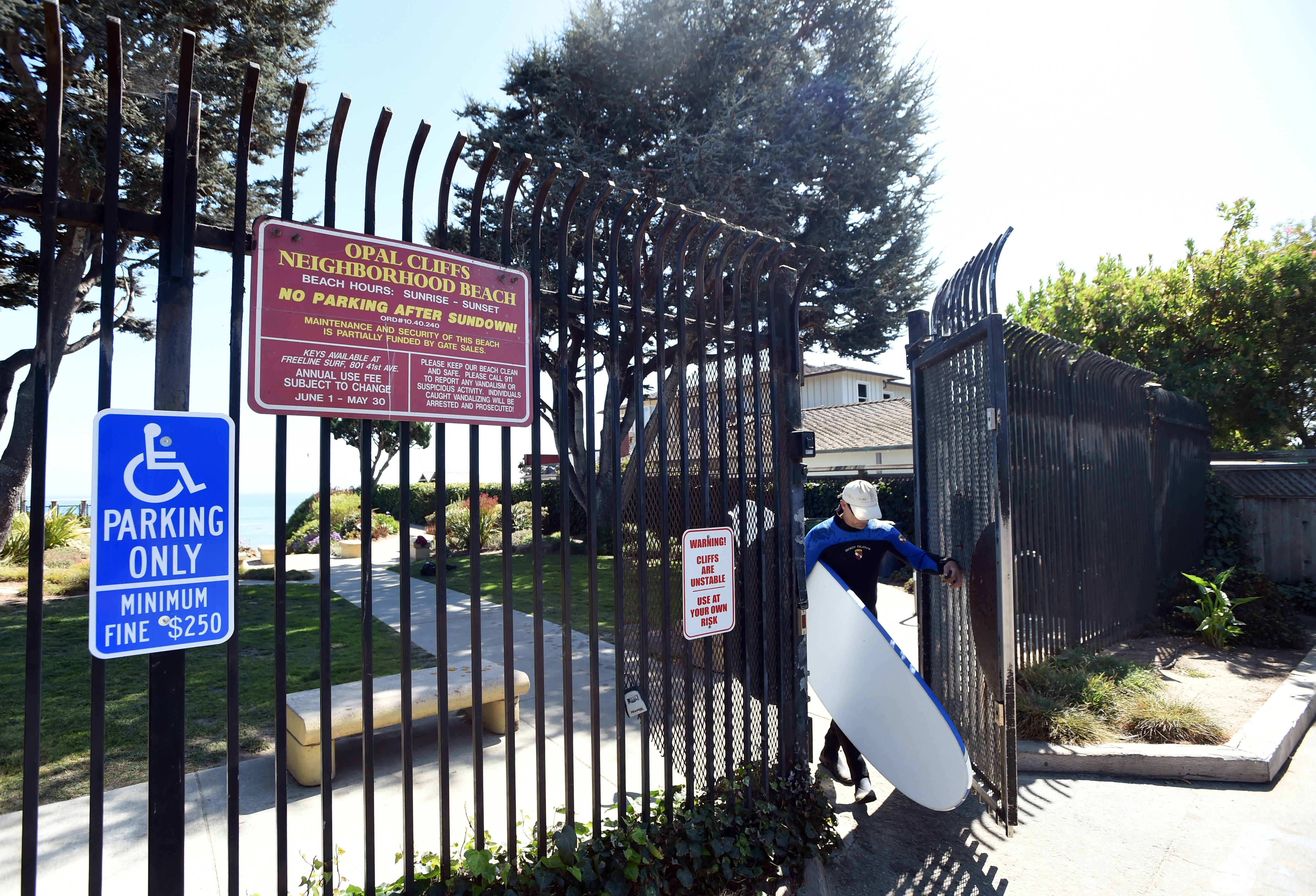Rough waters for California’s not so public beaches
At Privates Beach in the Opal Cliffs area of Santa Cruz, California, there is a $100 annual access fee and an imposing gate, even though it is supposed to be a public beach (JOSH EDELSON)
Santa Cruz (United States) (AFP) – The sandy cove along California’s picturesque coast beckons visitors to what is supposed to be a public beach. But the imposing gate, the security guard and the annual $100 access fee tell a different story.
Privates Beach, as the secluded spot in the city of Santa Cruz is known to locals, is at the center of an ongoing battle over the public’s right to access the Golden State’s fabled shoreline.
An hour’s drive north sits Martin’s Beach, where a David versus Goliath-type showdown has pitted a high-tech billionaire against surfers and state regulators.
For nearly a decade, Silicon Valley entrepreneur Vinod Khosla, who purchased the 53-acre (21.4-hectare) parcel for $32.5 million in 2008, has sought to limit access to the shoreline through his property.
Khosla has now taken the fight to the US Supreme Court, which is deciding whether to take on the case.
The two high-stakes disputes reflect the constant wave of legal challenges that have called into question California’s landmark 1976 Coastal Act, which enshrines public access to the state’s 1,271 miles (2,045 kilometers) of coastline.
– Keep out the riff-raff –
Most of the cases usually involve wealthy beachfront homeowners willing to go to great lengths — and to spend a great deal of money — to keep the riff-raff off the pristine sand.
“It’s relentless and it’s just constant pressure,” said Pat Veesart, who oversees enforcement of the Coastal Act in northern California.
“People who are wealthy enough, fortunate enough to be able to buy property along the coast are always trying to figure out a way to make them as exclusive as possible.”
A majority of the challenges are concentrated in southern California, notably Malibu, where celebrities who live along the 27 miles of coast known as Billionaire’s Beach have fought tooth and nail to keep their properties private.
“People go from just a little to quite far to discourage the public from using public lands,” said Linda Locklin, manager of the state’s coastal access program.
Some homeowners hire security guards to keep the public out, put up fake no parking or private beach signs, place cones in the roadway or file lawsuits that usually drag on for years, Locklin said.
– ‘Paradise’ lost –
The homeowners argue that visitors produce litter, vandalize property and are a constant nuisance that can turn their dream homes into a nightmare.
“Once they opened this up, it was like the gates of hell were unlocked,” Michael Lembeck, a film director, told AFP on a recent morning as he angrily pointed to an access path that opened in 2015 near his Malibu home.
“It was paradise here until three years ago,” he added. “A lot of people have moved… and we may be next.”
The same arguments about privacy and security are echoed at Privates Beach — a cheeky name earned during its past incarnation as a nude beach.
Sean Johansen, a police officer walking on the beach with a fellow officer after surfing, said the fence and access fee were no “big deal.”
“If they open that gate, there’s a lot of speculation that it could bring unsavory types hanging out at the beach — homeless people and maybe people using narcotics,” he told AFP.
Johansen, like half a dozen people interviewed at Privates, said anyone who did not wish, or could not afford, to pay the annual fee could easily go elsewhere.
“There are so many other beaches for people to go,” said Jeff Lebeouf, a local homeowner. “That’s the way it’s been and that’s the way I believe it should be because there are a lot of other options.”
– ‘I own Central Park’ –
But advocates of open beach access argue that should the gate operation continue and should Khosla, a co-founder of Sun Microsystems, prevail in the nation’s highest court, that could set a bad precedent and rewrite the rules governing California’s coast.
“We see the beach as part of our soul,” said Noaki Schwartz, a California native and spokesperson for the state’s Coastal Commission. “It’s very ingrained in California that the beaches are a gathering area.”
Neither Khosla nor his attorney could be reached for comment for this article. But he told The New York Times in a recent interview that he was waging his battle on principle and doesn’t even care much for the property.
“If this hadn’t ever started, I’d be so happy,” he told the Times. “But once you’re there in principle, you can’t give up principle.”
For now, Martin’s Beach is open to the public. But the surfers who use it say that could change overnight if Khosla succeeds in his legal battle.
“If the ownership were to prevail, that would set a precedent that would allow incredibly wealthy individuals to purchase land adjacent to the coast and slowly but surely turn that public resource into a private good,” said Eric Buescher, an attorney representing the Surfrider Foundation, which sued Khosla.
“It’s the equivalent of buying all the property around Central Park in New York and saying ‘Ha, now I own Central Park’.”
Disclaimer: This story has not been edited by Siliconeer and is published from a syndicated feed. Siliconeer does not assume any liability for the above story. Validity of the above story is for 7 Days from original date of publishing. Content copyright AFP.


